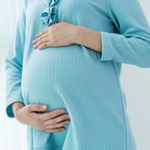Selective serotonin reuptake inhibitor (SSRI) antidepressants may affect platelet aggregation and thus may increase the risk of bleeding. Several studies have sought to determine if exposure to SSRI antidepressants in late pregnancy is associated with an increased risk of postpartum hemorrhage.
The most recent study analyzed data from the Norwegian Mother and Child Cohort Study and the Medical Birth Registry of Norway, including 57,279 pregnant women. Of those included, 1.02% reported use of antidepressants during pregnancy, mostly SSRIs/SNRIs (0.92%). The risk of postpartum hemorrhage compared with non-exposed subjects:
- First trimester exposure to SSRIs/SNRIs or TCAs/other antidepressants did not increase the risk of vaginal bleeding in early pregnancy (adjusted OR, 0.91; 95% CI, 0.72-1.16 and aOR, 0.83; 95% CI, 0.36-1.92, respectively).
- Exposure to SSRIs/SNRIs after week 30 did not confer any increased risk of postpartum hemorrhage after vaginal delivery (aOR, 0.90; 95% CI, 0.47-1.74) or cesarean section (aOR, 1.47; 95% CI, 0.51-4.22) delivery.
Based on these findings, the authors concluded: “Among this Norwegian cohort of pregnant women, use of antidepressants in pregnancy was not associated with any obstetrical bleeding outcome.”
In another study published this year, Palmsten and colleagues analyzed data from 106,000 pregnant women aged 12-55 with a diagnosis of mood or anxiety disorder who were part of a nationwide Medicaid database.
12,710 (12%) of the women had exposure to SSRI, and 1495 (1.4%) women had exposure to non-SSRI antidepressant. The risk of postpartum hemorrhage:
- Mood/anxiety disorders but no exposure to antidepressant: 2.8%
- Current users of SSRI: 4.0%
- Current users of non-SSRIs: 3.8%
Compared to women with no antidepressant exposure, women with current exposure to SSRIs had a 1.47-fold increased risk of postpartum hemorrhage (95% confidence interval 1.33 to 1.62). Women with current non-SSRI exposure had a 1.39-fold increased risk (CI: 1.07 to 1.81). The increased risk was similar across all types of antidepressants, regardless of their affinity for the serotonin transporter.
The rates of postpartum hemorrhage reported by Palmsten et al were higher than those observed in a third study, a nested case-control study from Salkeld and colleagues from Canada. They identified cases of postpartum hemorrhage (n=2460) and a group of matched controls without postpartum hemorrhage (n=23,943) from the same cohort. The adjusted odds ratio for the association between postpartum hemorrhage and SSRI use within 90 days of delivery was 1.30 (95% confidence interval, 0.98-1.72) as compared with 1.12 (95% confidence interval, 0.62-2.01) for users of non-SSRI antidepressants. The researchers conducting this study concluded: “Selective serotonin reuptake inhibitors confer no disproportionate risk of postpartum hemorrhage at the time of delivery compared with non-SSRI antidepressants.”
The Take-Home Message
While postpartum hemorrhage is a potentially serious complication, the data we do have are reassuring and the risk of postpartum hemorrhage appears to be unchanged, or minimally increased, in women taking SSRIs near the time of delivery. It is obviously difficult to compare the findings across different studies carried out in different populations using different methodologies. It is possible that the Palmsten study, which consists of low-income women, may have inadvertently measured other risk factors for PP hemorrhage (e.g., multiple pregnancies, history of PP hemorrhage, obesity, diabetes) which are more common in this population as compared to the Canadian and Norwegian populations analyzed in the other two studies.
That said, if we assume the estimates from the Palmsten study are correct, the use of SSRI antidepressants did not dramatically increase the risk of postpartum hemorrhage, measuring a 1.47-fold increase in risk. The authors estimate one additional case of postpartum hemorrhage for every 80 to 100 women treated with antidepressants. Given the inconsistency of these findings and the relatively small increase in risk observed in one of the three studies, we do not have compelling evidence to change our practices regarding the use of SSRIs and other antidepressants during pregnancy. Obstetricians, however, should be alert to the possibility of an increased risk of PP hemorrhage in this population, so that hemorrhage, should it occur, may be managed aggressively, thereby minimizing maternal morbidity.
Ruta Nonacs, MD PhD
Lupattelli A, Spigset O, Koren G, Nordeng H. Risk of Vaginal Bleeding and Postpartum Hemorrhage After Use of Antidepressants in Pregnancy: A Study From the Norwegian Mother and Child Cohort Study. J Clin Psychopharmacol. 2013 Oct 16. [Epub ahead of print]
Palmsten K, Hernández-Díaz S, Huybrechts KF, et al. Use of antidepressants near delivery and risk of postpartum hemorrhage: cohort study of low income women in the United States. BMJ 2013; 347:f4877.
Salkeld E, Ferris LE, Juurlink DN. The risk of postpartum hemorrhage with selective serotonin reuptake inhibitors and other antidepressants. J Clin Psychopharmacol 2008; 28(2):230-4.








Leave A Comment